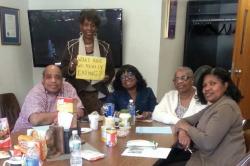July 16, 2015
 The Roxbury Dorchester Mattapan Hyde Park Dialysis Support Group meet on the first Saturday of each month at Twelfth Baptist Church in Roxbury. India Smith photo
The Roxbury Dorchester Mattapan Hyde Park Dialysis Support Group meet on the first Saturday of each month at Twelfth Baptist Church in Roxbury. India Smith photo
Gloria Murray had been on dialysis for just over a month when she attended a recent meeting of the Roxbury Dorchester Mattapan Hyde Park (RDMH) Dialysis Support Group. Although Murray, 52, had received 20 dialysis treatments by that point, the process was still a mystery to her. Each time she went to her 4 p.m.-to-8 p.m. session in a large open room filled with the hum of machines, she had questions. But the nurses and technicians had little time to talk.
“They want to finish the shift, clean up, and get ready for the next day,” said Murray. Starting at 6 o’clock the following morning, there would be another shift of patients, then another and another after that. By the end of each treatment, Murray herself would be tired, wanting nothing more than to be disconnected from the machine, find her ride, and get home to rest. But on each occasion she left with new concerns about her condition and how the therapy was working.
Dialysis is a separate world with its own language, routines, and diet. In hemodialysis, a machine circulates the blood through a filter to be cleansed. The process removes waste products and fluid that build up when the kidneys are not working. The removal of the fluid can leave patients feeling weak and exhausted.
Last month, after Murray posted her concerns on Facebook, her friend Robert Kinney called. He is the current leader of RDMH. A Dorchester resident, Kinney, 52, received a kidney by transplant in 2014, after eight years on dialysis. He urged Murray to attend the group’s meeting, where she would get information and be in a supportive environment with people who would understand what she has been going through.
“I still don’t really know how the machine works,” said Murray. “They gave me a packet of information with a DVD and some diet information on what I should be eating and drinking, but I have not had a chance to sit down and read it.” Kinney advised Murray to get a three-ring binder and keep copies of her lab work and other reports. “You need to monitor your own condition,” he said.
Barbara Gibbs, who founded the group 19 years ago, said that most patients have very little information about dialysis before they start treatments. Kidney failure develops gradually, often driven by diabetes or high blood pressure. The damage takes years. But once the end stage arrives, symptoms can come on rapidly, leaving little time to prepare.
First as a dialysis technician and later as a dialysis nurse, Gibbs talked with patients individually, but she found that it was not helpful. “Lecturing patients during their dialysis treatment was not the right approach,” she said. So she decided to start a support group to serve the inner city, where kidney disease is three times as prevalent as in metropolitan Boston overall. She named the group after the communities it serves: Roxbury, Dorchester, Mattapan and Hyde Park. In the early days, she drove from center to center to post flyers in the waiting rooms of dialysis clinics. She gave copies to physicians to distribute in their offices. Today she also uses Facebook.
RDMH meets on the first Saturday of the month in the Outreach Center at Twelfth Baptist Church on Warren Street in Roxbury. The location is convenient, it’s wheelchair accessible, parking is free, and the membership is diverse in every sense, especially in relation to dialysis. A recent meeting included someone seeking information on how to prevent kidney disease, someone on dialysis for a month, someone on dialysis for seven years, someone on dialysis for 15 years, a transplant recipient, Gibbs, another nurse, a nutrition consultant, and a reporter.
Group member Scarlet Boson, 35, likes the openness. “Anyone can come in and get information,” she said. This helps spread the word in the community. “Because of the high prevalence of kidney disease in communities of color, prevention is a priority,” Boson said.
A face-to-face group, especially for people new to dialysis, seems very much worth the effort. Gibbs believes there is no substitute for meeting with other patients in person. “Many people still don’t have Internet access or don’t use it,” she said. For these individuals, online information and virtual support groups are of little help.”
At the meeting, Robert Kinney led the group in the Serenity Prayer, read the announcements, then introduced nutrition consultant Fulani Marilyn Haynes, RN to conduct a workshop on reading food labels. When the kidneys are not working, elements in food that are normally beneficial, like potassium, can reach toxic levels. Thus people on dialysis are on a diet that severely restricts fruits and vegetables, whole grains, dairy products and fluid, so deciphering food labels is an essential skill.
As the meeting was about to break up, Murray expressed what had been on her mind all along: “People have told me that when you go on dialysis, your life is over,” she said. Then voices came from every part of the room: “You can live with it!”


